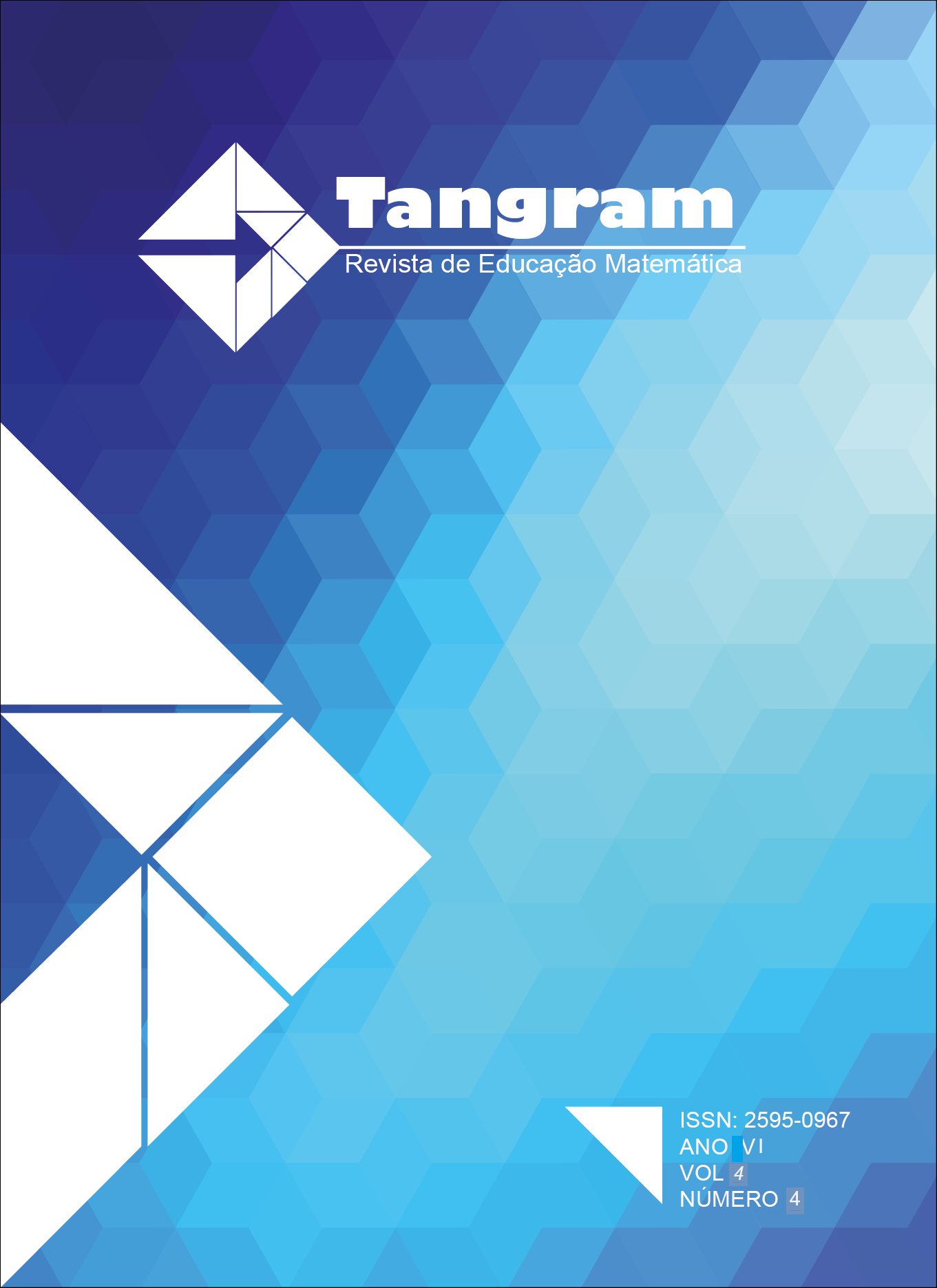The Use of Basic Calculator Codes in Tasks of Formulating and Solving Mathematical Problems: a case study in the OBEDUC/CAPES project
DOI:
https://doi.org/10.30612/tangram.v6i4.17195Keywords:
Formulação e resolução de problemas matemáticos, Calculadora básica, EstratégiasAbstract
This article was part of a research project carried out under the Project Investigating the Formulation and Resolution of Mathematical Problems in the Classroom: Exploring Connections between School and University, of the Education Observatory Program, OBEDUC/CAPES (2013-2015). In this research, we reflect on the possibilities that a technological didactic resource can provide as an alternative strategy for problem solving and envisaging its use in other activities that require different representations. The objective was to analyze how a group of four students conceive, formulate and solve mathematical problems based on the use of Basic Calculator codes as strategies to solve mathematical problems. The research has a qualitative approach, case study, and methodological aspects of the formulation and resolution of mathematical problems. The results suggest that the students were able to formulate open problems, use different mathematical contents, in which they had difficulties in previous years and diversify their resolution strategies with the use of basic calculator codes.
Downloads
References
Almeida, M. E. B.; Valente, J. A. Tecnologias e Currículo: trajetórias convergentes ou divergentes? São Paulo: Editora Paulus, 2011.
Amado, N., Amaral, N. E, Carreira, S. (2009). A liberdade que as tecnologias permitem: Trabalhando os números e as capacidades Matemáticas transversais. Actas do XIX Encontro de Investigação em Educação Matemática - Vila Real: Portugal.
Bittar, M. (2011). A abordagem instrumental para o estudo da integração da tecnologia na prática pedagógica do professor de Matemática. Educar em Revista, Curitiba: v. 1/2011, p. 157-171. Editora UFPR.
Borba, M. C., & Araújo, J. L. (2012). Pesquisa Qualitativa em Educação Matemática. Belo Horizonte: Autêntica.
Brasil. (2018). Base Nacional Comum Curricular. Brasília: Ministério da Educação.
Brasil. (1998). Parâmetros curriculares nacionais: terceiro e quarto ciclos: apresentação dos temas transversais. Brasília: Ministério da Educação.
Butts, T. (1997). Formulando problemas adequadamente. In: A Resolução de Problemas na Matemática Escolar. Stephen Krulik e Robert E. Reys (Organizadores). Tradução: Hygino H. Domingues e Olga Corbo. São Paulo: Atual.
Duea, J., Immerzeel, G., Ockenga, E., Tarr, T. (1997). Resolução de problemas com o uso da calculadora. In: A Resolução de Problemas na Matemática Escolar. Stephen Krulik e Robert E. Reys (Organizadores). Tradução: Hygino H. Domingues e Olga Corbo. São Paulo: Atual.
Medeiros, K. M. (2005). Atividades com a calculadora para a sala de aula. Apostila.
Medeiros, K. M. (2003). A influência da calculadora na resolução de problemas matemáticos abertos. Educação Matemática em Revista. (10) 14, 19-28.
Medeiros, K. M. (2001). O contrato didático e a resolução de problemas matemáticos em sala de aula. Educação Matemática em Revista. (9) 10, 32-39.
Medeiros, K. M., & Santos, A., J., B. (2007). Uma experiência didática com a formulação de problemas matemáticos. Zetetiké. (15) 28, 87-118.
NCTM. (2007). Princípios e Normas para a Matemática Escolar. Lisboa: APM. (Tradução portuguesa da edição original de 2000 - Principles and Standards for School Mathematics. USA: NCTM).
ONUCHIC, L. R. Uma História da Resolução de Problemas no Brasil e no mundo. Anais do I Seminário de Resolução de Problemas. (I SERP). Rio Claro: Unesp. 2008.
Ponte, J. P. (2005). Gestão curricular em Matemática. GTI (Ed.), O professor e o desenvolvimento curricular (pp. 11-34). Lisboa: APM.
Ponte, J. P. (2006). Estudos de caso em educação matemática. Bolema. (19) 25 p. 105-132.
Ponte, J. (1992). Concepções dos Professores de Matemática e Processos de Formação. In M. Brown, D. Fernandes, J. Matos e J. Ponte (Coord.), Educação Matemática (pp. 185-239). Lisboa: Instituto de Inovação Educacional.
Santos, V. M. (2009). A relação e as dificuldades dos alunos com a Matemática: um objeto de investigação. Zetetiké (17) n. n. esp.
Silva, R. A. (2015). Investigando processos de raciocínios através da formulação e resolução de problemas matemáticos a partir de textos no sentido Bakhtiniano. Trabalho de Conclusão de Curso. Universidade Estadual da Paraíba, Campina Grande, Paraíba, Brasil. Recuperado de
https://dspace.bc.uepb.edu.br/jspui/handle/123456789/8647
Yin, R. K. (2010). Estudo de caso: planejamento e métodos. Trad. Ana Thorell. 4ª ed. Porto Alegre: Bookman.
Downloads
Published
How to Cite
Issue
Section
License

This work is licensed under a Creative Commons Attribution-NonCommercial-ShareAlike 3.0 Unported License.
Authors must accept the publication rules when submitting the journal, as well as agree to the following terms:
(a) The Editorial Board reserves the right to make changes to the Portuguese language in the originals to maintain the cultured standard of the language, while respecting the style of the authors.
(b) Authors retain the copyright and grant the journal the right to first publication, with the work simultaneously licensed under the Attribution-NonCommercial-ShareAlike 3.0 Brazil (CC BY-NC-SA 3.0 BR) that allows: Share - copy and redistribute the material in any medium or format and Adapt - remix, transform, and create from the material. CC BY-NC-SA 3.0 BR considers the following terms:
- Attribution - You must give the appropriate credit, provide a link to the license and indicate whether changes have been made. You must do so under any reasonable circumstances, but in no way that would suggest that the licensor supports you or your use.
- NonCommercial - You may not use the material for commercial purposes.
- Sharing - If you remix, transform, or create from material, you must distribute your contributions under the same license as the original.
- No additional restrictions - You may not apply legal terms or technological measures that legally restrict others from doing anything that the license permits.
(c) After publication, authors are allowed and encouraged to publish and distribute their work online - in institutional repositories, personal page, social network or other scientific dissemination sites, as long as the publication is not for commercial purposes.






